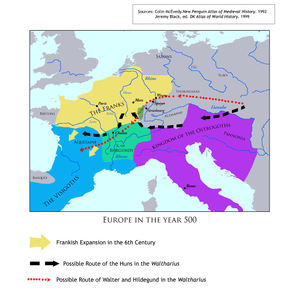Difference between revisions of "Waltharius1062"
m (→Gunther tries to persuade Hagen to help him to defeat Waltharius; remembering his wounded honor, Hagen refuses (1062–1088)) |
(removed gay porn link (?) on "wounded honour") |
||
| Line 1: | Line 1: | ||
| − | ===Gunther tries to persuade Hagen to help him to defeat Waltharius; remembering his | + | ===Gunther tries to persuade Hagen to help him to defeat Waltharius; remembering his wounded honor, Hagen refuses (1062–1088)=== |
{| | {| | ||
|- | |- | ||
Latest revision as of 15:37, 5 December 2020
Gunther tries to persuade Hagen to help him to defeat Waltharius; remembering his wounded honor, Hagen refuses (1062–1088)
| His rex infelix visis suspirat et omni | Aeneid 3.172: talibus attonitus visis. . . ‘Awed by this vision. . .’
|
SSSSDS | ||||
| Aufugiens studio falerati terga caballi | Georgics 3.318: omni studio. . . ‘The more zealously. . .’ Prudentius, Psychomachia 195-196.: phaleratum/ circumflectit equum. ‘She circles round on her bedecked steed.’
|
DDDSDS | ||||
| Scandit et ad maestum citius Haganona volavit | DSDDDS | |||||
| Omnimodisque illum precibus flexisse sategit, | 1065 | Flexisse sategit equiv. to flectere studuit
|
Aeneid 2.689: precibus si flecteris ullis. . . ‘If you are moved by any prayers. . .’
|
DSDSDS Elision: omnimodisque illum |
||
| Ut secum pergens pugnam repararet. at ille: | SSSDDS | |||||
| Me genus infandum prohibet bellare parentum, | Genus infandum: in this speech Hagen sarcastically recalls the king’s insults about his father (cf. lines 629-631).
|
DSDSDS | ||||
| Et gelidus sanguis mentem mihi ademit in armis. | Aeneid 3.30: gelidusque coit formidine sanguis. ‘My chilled blood freezes with terror.’ 3.259-260.: at sociis subita gelidus formidine sanguis/ deriguit. ‘But my comrades’ blood chilled and froze with sudden fear.’
|
DSSDDS Elision: mihi ademit |
||||
| Tabescebat enim genitor, dum tela videret, | SDDSDS | |||||
| Et timidus multis renuebat proelia verbis: | 1070 | DSDSDS | ||||
| Haec dum iactasses, rex, inter te comitantes, | Aeineid 1.102: talia iactanti. . . ‘As he flings forth such words. . .’
|
SSSSDS | ||||
| Extitit indignum nostri tibi quippe iuvamen.' | Nostri: With iuvamen, equivalent to nostrum. Or perhaps with indignum (cf. Aen. 12.649: indignus avorum); in the latter case tibi would have to be taken closely with iuvamen.
|
DSSDDS | ||||
| Ille recusanti precibus nihilominus instans | Ille equiv. to rex
|
DSDDDS | ||||
| Talibus aversum satagit revocare loquelis: | DSDDDS | |||||
| Deprecor ob superos, conceptum pone furorem. | 1075 | Aeneid 4.501-502.: tantos mente furores/ concipit. ‘Her mind dreams not of such frenzy.’
|
DDSSDS | |||
| Iram de nostra contractam decute culpa, | SSSSDS | |||||
| Quam vita comitante, domum si venero tecum, | SDDSDS | |||||
| Impensis tibimet benefactis diluo multis. | SDDSDS | |||||
| Nonne pudet sociis tot cognatisque peremptis | DDSSDS | |||||
| Dissimulare virum? magis, ut mihi quippe videtur, | 1080 | Dissimulare virum equiv. to simulare feminam
|
Ovid, Ars Amatoria 1.690: veste virum longa dissimulatus erat. ‘He had disguised his manhood in a woman’s robe.’
|
DDDDDS | ||
| Verba valent animum quam facta nefanda movere. | DDSDDS | |||||
| Iustius in saevum tumuisses mente tyrannum, | DSDSDS | |||||
| Qui solus hodie caput infamaverat orbis. | Caput…orbis: the poet alludes to the situation of his own time, the era of Charlemagne, when the Frankish kings really had such a status.
|
SDDSDS | ||||
| Non modicum patimur dammum de caede virorum, | Aeneid 11.634: caede virorum. . . ‘With the slaughter of the riders. . .’
|
DDSSDS | ||||
| Dedecus at tantum superabit Francia numquam. | 1085 | Aeneid 10.681: ob tantum dedecus amens. . . ‘In madness because of disgrace so foul. . .’
|
DSDSDS | |||
| Antea quis fuimus suspecti, sibila dantes | Quis equiv. to quibus Suspecti: “feared”
|
DDSSDS | ||||
| Francorum dicent exercitus omnis ab uno, | Aeneid 9.783-784.: unus homo et vestris, o cives, undique saeptus/ aggeribus tantas strages impune per urbem/ ediderit? ‘My countrymen, shall one man, hemmed in on every side by your ramparts, deal such carnage throughout the city and go unpunished?’
|
SSSDDS | ||||
| Proh pudor ignotum vel quo, est impune necatus! | Aeneid 9.783-784.: unus homo et vestris, o cives, undique saeptus/ aggeribus tantas strages impune per urbem/ ediderit? ‘My countrymen, shall one man, hemmed in on every side by your ramparts, deal such carnage throughout the city and go unpunished?’
|
DSSSDS Elision: quo est |
